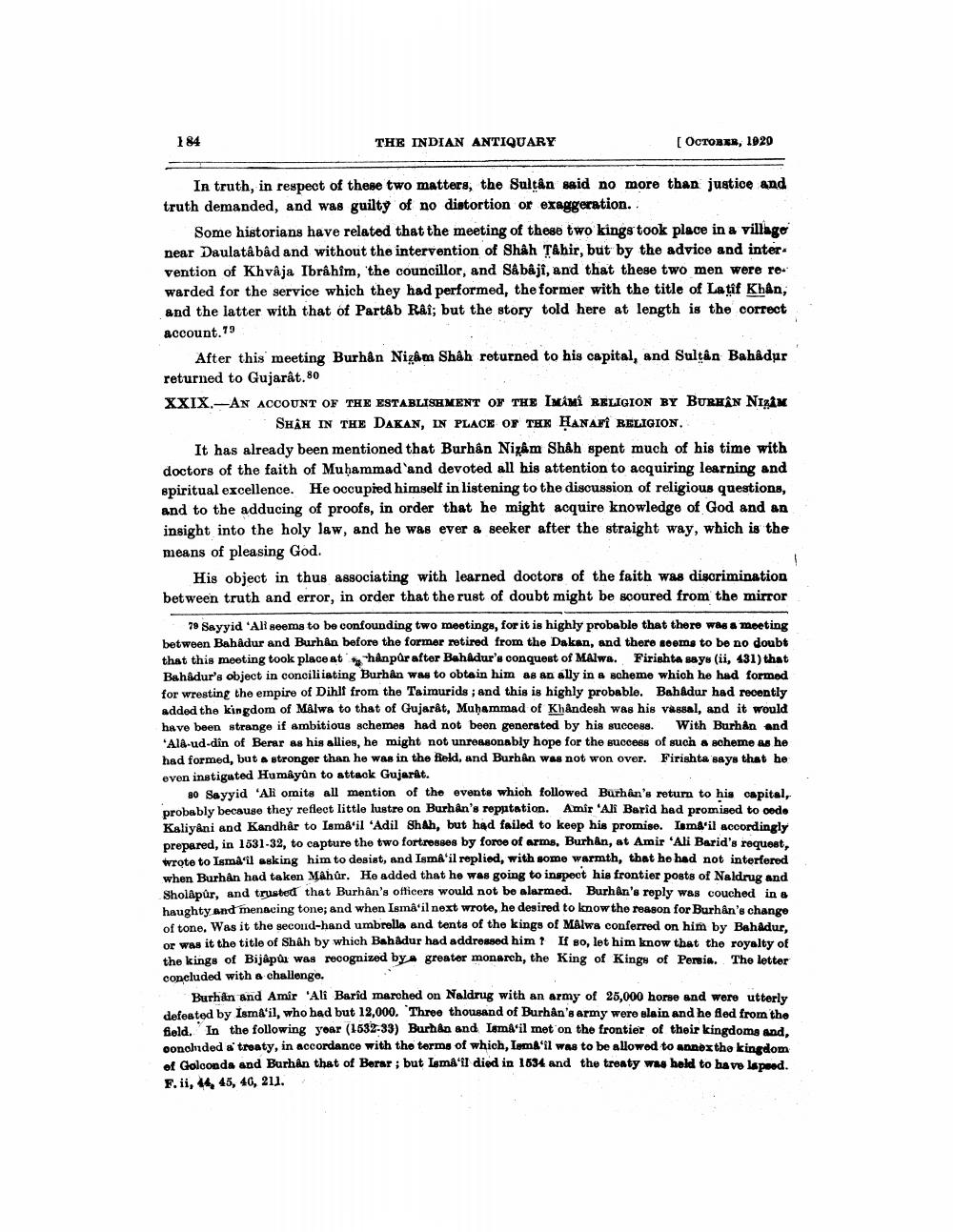________________
1 84
THE INDIAN ANTIQUARY
[OCTOBER, 1920
In truth, in respect of these two matters, the Sultan said no more than justice and truth demanded, and was guilty of no distortion or exaggeration.
Some historians have related that the meeting of these two kings took place in a village near Daulatâbâd and without the intervention of Shâh T&hir, but by the advice and inter vention of Khvája Ibrahim, the councillor, and Såbaji, and that these two men were rewarded for the service which they had performed, the former with the title of Latif Khân, and the latter with that of Part&b Rai; but the story told here at length is the correct account.79
After this meeting Burhan Nizam Shâh returned to his capital, and Sultan Bahadur returned to Gujarât. 80 XXIX.-AN ACCOUNT OF THE ESTABLISHMENT OF THE INÁMI RELIGION BY BURHÂN NIzin
SHẦH IN THE DAKAN, IN PLACE OF THE HANAFI RELIGION, It has already been mentioned that Burhan Nizam Shah spent much of his time with doctors of the faith of Muhammad and devoted all his attention to acquiring learning and spiritual excellence. He occupied himself in listening to the discussion of religious questions, and to the adducing of proofs, in order that he might acquire knowledge of God and an insight into the holy law, and he was ever & seeker after the straight way, which is the means of pleasing God.
His object in thus associating with learned doctors of the faith was discrimination between truth and error, in order that the rust of doubt might be scoured from the mirror
79 Sayyid 'All seems to be confounding two meetings, for it is highly probable that there was a meeting between Bahadur and Burhan before the former retired from the Dalan, and there sooms to be no doubt that this meeting took place at hånpur after Bahadur's conquest of MAlwa. Firishta says (ii, 431) that Bahadur's object in conciliiating Burhan was to obtain him as an ally in a scheme which he had formed for wresting the empire of Dihlf from the Taimurids; and this is highly probable. Bahadur had recently added the kingdom of Malwa to that of Gujarat, Muhammad of Khandesh was his vással, and it would have been strange if ambitious schemes had not been generated by his success. With Burhån and *All-ud-din of Berar as his allies, he might not unreasonably hope for the success of such a scheme as he had formed, but a stronger than he was in the field, and Burhan was not won over. Firishta says that he even instigated Humayun to attack Gujarat.
90 Seyyid 'Ali omita all mention of the events which followed Burhan's return to his capital, probably because they reflect little lustre on Burhan's reputation. Amir 'Ali Barid had promised to codo Kaliyâni and Kandhår to Isma'il 'Adil ShAh, but had failed to keep his promise. Lama'il accordingly prepared, in 1531-32, to capture the two fortresses by force of arms, Burhån, at Amir 'Ali Barid's request, wrote to Ismail asking him to desist, and Isma'il replied, with some warmth, that he had not interfered when Burhan had taken Mahûr. He added that he was going to inspect his frontier posts of Naldrug and Sholapúr, and trusted that Burhan's officers would not be alarmed. Burhan's reply was couched in a haughty and menacing tone; and when Ismâ'il next wrote, he desired to know the reason for Burhan's change of tone. Was it the second-hand umbrella and tents of the kings of MAlwa conferred on him by Bahadur. Or was it the title of Shah by which Bahadur had addressed him t If so, let him know that the royalty of the kings of Bijapur was recognized by greater monarch, the King of Kings of Persia. The letter concluded with a challenge.
Burhan and Amir 'Ali Barid marched on Naldrug with an army of 25,000 horse and were utterly defeated by Ismail, who had but 12,000. Three thousand of Burhan's army were slain and he fled from the fald. In the following your (1632-33) Burhan and Isma'il met on the frontier of their kingdoms And. conohided a treaty, in accordance with the terms of which, Lama'il was to be allowed to annex the kingdom
Golconds and Burhan that of Berar ; but Lemâ'il died in 1634 and the treaty was held to have speed. F.ii, 44, 45, 46, 211.




